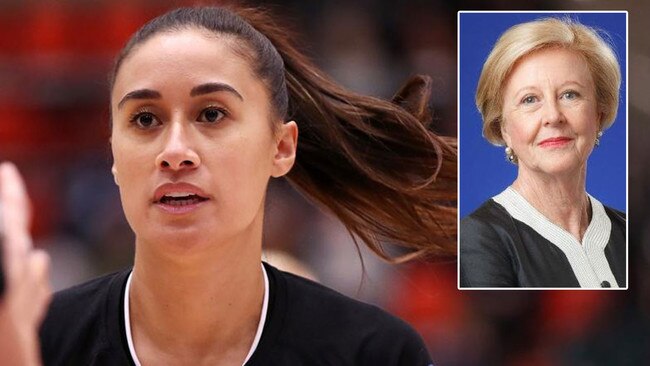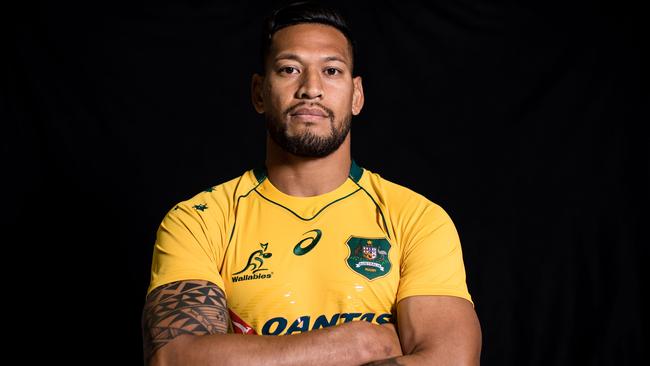Triggs: Maria Folau bullied by sponsors over Israel post
Gillian Triggs accuses Maria Folau’s sponsors of “bullying”; Alan Jones calls Israel’s battle “defining’’.

The former head of the Human Rights Commission has accused Maria Folau’s sponsors of “bullying” her after she shared a link to her husband’s fundraising page on social media.
Gillian Triggs said it was unacceptable that sponsors of Netball Australia contacted Maria’s employer over her post and described the attacks on Maria and Israel Folau as “vicious and ill-informed”.
“When it comes to Maria Folau, it concerns me it is part of what we see in a great deal of public bullying,” Professor Triggs told The Telegraph today.
Professor Triggs said court proceedings for Israel Folau against Rugby Australia were important because most Australians did not understand the law and wrongly turned the debate into one of “morality and ethics”
“The nature of the debate really is quite vicious and ill-informed,” she said.
MORE: ‘Fund ludicrous but Maria should play’ | Sponsors ‘moral arbiter of acceptable thinking’ | Cory Bernardi writes: Totalitarian crock at end of activists’ rainbow
Her comments come as 2GB radio host Alan Jones renewed his call to action for Australians to donate to the ACL fund which has now topped $2.1 million.
He told his listeners this morning that Folau’s legal battle was “one of the defining cases of our time” and compared it to Eddie Mabo’s landmark Native title case in the High Court.
“We should all be doing our little bit because Israel Folau is fighting the battle for all of us,” he said.
“These are essential freedoms … it’s a bit like the Mabo case, these are significant changes that must be made to the way we run our society if we are free and democratic,” he added.
Netball sponsors including ANZ, HCF and Mazda reportedly told Netball Australia they were unhappy with Maria’s decision on Friday to re-post a link to her husband’s now defunct GoFundMe page.
“Mazda does not support discrimination of any kind and we trust that Netball South Australia will manage this in the most inclusive and supportive way possible,” A spokesman for Mazda said in a statement to Netball Australia.
HCF told Netball Australia there was an urgent need for “a strong, clear and well-enforced social media policy and education among its players and staff”.
“We appreciate the complexities of the Folau matter and acknowledge that views do differ in the community, however, we do not support Maria Folau’s stance on this matter,” an HCF spokesman said.
“There is no place in our society for discrimination of any kind, including on the basis of gender, religious belief, age, race or sexual orientation.”
Professor Triggs said that it showed “a growing voice” of bullying of women in public roles.
“Once a woman is in any kind of public role there is a tendency to take her down. Whether she is a sporting person or a political person, there is a growing voice bullying those women, hoping they will be denigrated,” she said.

“Freedom of religious expression is protected in the constitution. The question in this case is does an employer have a right to impose values and standards on their employees where that might conflict with their fundamental rights.”
A Netball South Australia spokeswoman said the organisation was still standing by Maria Folau’s freedom of religious expression.
Professor Triggs said she had become “concerned with the direction in which the debate has turned regarding the protection of religious expression along with the right to a freedom of speech in common law’’.
“Freedom of religious expression is protected in the constitution,’’ she wrote in an opinion column.
“The question that will be asked in the courts is can an employment contract restrict these fundamental rights and is losing your job as a consequence of this disproportionate of the reasonable requirement of rugby Australia to have values.
“I do not know which way the courts will go on this but they may very well say employers cannot restrict these fundamental rights. Other judges might say you cannot have abusive language of this kind. However, people in the Twitter world have raised section 18C of the Racial Discrimination Act as being an issue for Folau but there is no such legislation in that act which prevents abuse on the grounds of sexual discrimination.”
Professor Triggs said we need “clarity and for this to be set out in a clear manner because Australians simply do not understand their own legal system or what rights they have’’.
“This is why I have advocated for a charter of rights to be produced,’’ Professor Triggs wrote.
“The problem with what I am seeing on social media in reaction to the new fundraiser, which is raising even more than the first one, is that arguments are being formed based on highly personal, emotional, moral or ethical views and you find the discussion slips away and there are no benchmarks. It is all bundled up in factors unrelated to the law.
“When you get the Twitter world raging on these issues you get highly vicious responses which are not only unhelpful, but unjustified.
“Especially when there is every reason to think this man is genuine in his beliefs. Even though almost all of us say his comments are wrong, the key point is that he is acting in good faith and how far does that right of religious expression from the constitution go towards protecting him?
“When it comes to Maria Folau, It concerns me it is part of what we see in a great deal of public bullying.’’
Professor Triggs said the battle between Israel Folau and Rugby Australia was “ an issue of enormous complexity and we are directly mixing up the protection of religious expression and the right to freedom of speech in common law with an employment contract’’.
“So the legal question really crystallises into whether or not an employer, government or private, can restrict the right of someone to exercise to exercise their right of free speech or religious expression,’’ she wrote.
“Yes, words have consequences and parliament may need to consider whether legislation should be introduced to prohibit abuse of those of a different sexual orientation to reflect community values of respect and equality before the law. My view is that we need a charter of rights to set out freedoms and responsibilities so that we are all better informed
“But I can’t see any reason in a free society that raising funds to test Israel Folau’s case in the courts is wrong.’’



To join the conversation, please log in. Don't have an account? Register
Join the conversation, you are commenting as Logout